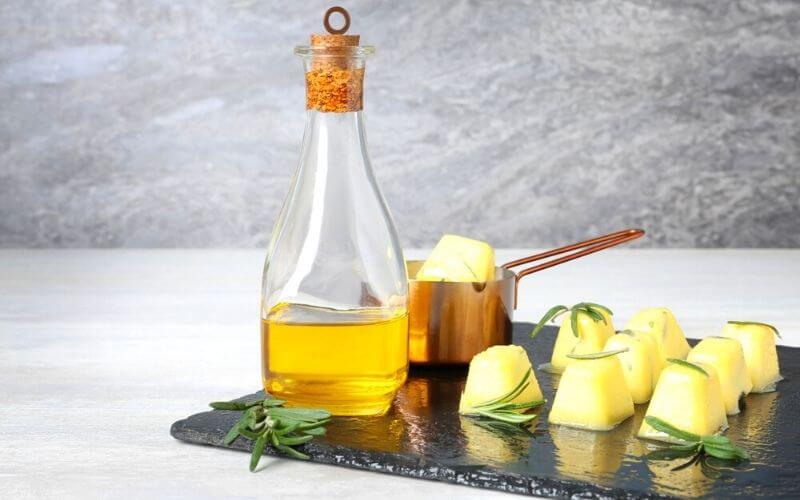Olive oil has been used by mankind for ages.
For thousands of years, people have been using them for cooking and preserving food. Popular in the Mediterranean and the Middle East, olive oil is now popular across the globe, thanks to research that proves it is a much healthier oil compared to canola or sunflower oil.
But olive oil, especially the good kind, can be expensive. Many people take advantage of mega sales and buy extra-virgin olive oil in bulk. The issue? Your bulk stash of oil can go rancid very quickly, and just end up being a waste of money.
What can one do instead? Can you freeze olive oil? Many people think freezing oils cause them to lose flavor. But we’re here to tell whether you can preserve olive oil and the best way to do so.
A Brief History of Olive Oil

Olive oil, as the name suggests, is produced by extracting the juice from olives. Olive trees were first grown and harvested in the Mediterranean basin nearly 6000 years ago. It was first used in religious rituals as lamp fuels and as an offering to gods in this region around 2500 BC.
This gradually evolved to the oil being used for cooking purposes during the 5th-4th century BC. In more recent years, olive oil is used predominantly in Italian, Greek, and Middle Eastern cuisine.
It is also growing in popularity across North America over the past century. Olives are even grown in California and this oil is seen as healthier and more flavorful than many others. It is also a common vegetable oil substitute.
Besides cooking and baking, olive oil is used in hair, nail, and skincare by people across the world.
Producing Olive Oil
Olive oil is made by grinding olives and extracting the oil through either mechanical or chemical processes. Green olives usually produce more bitter oil, compared to black olives. On the other hand, overripe olives can produce rancid oil.
Because of this, the olives used for producing oil need to be perfectly ripe. The following processes take place to extract olive oil from the fruit:
- The olives are first crushed to make a paste.
- After grinding, the olive paste is spread across fiber disks stacked over each other in a column, then placed into the press. Pressure (or a centrifuge) is then used to separate the vegetal liquid from the paste.
- The paste is then stirred slowly in a special container, tiny oil drops cumulate into bigger drops, speeding up the mechanical extraction. This oil is then separated from the rest of the paste with a second round of centrifuging.
How long does it take for olive oil to form? This depends on the exact method being used. - Lastly, the extracted oil is filtered to remove debris and impurities.
Different Kinds of Olive Oil:
As you may have noticed, different kinds of brands of olive oil have different tastes. This is because the flavor depends on the region where the olives were harvested, the exact extraction process, and the kind of olives used.
Different kinds of olive oil also have different purposes. That being said, there are a few different kinds of oil being sold.
Extra Virgin Olive Oil:
This is the oil most often used by chefs as it is the highest quality and grade of olive oil. EVOO is extracted through purely mechanical processes, instead of chemical ones. This makes the oil purer and gives it a stronger, ‘rawer’ flavor.
It also has no more than 0.8% free acidity. All this means that EVOO has a superior taste and a beautifully complex flavor that makes it great for salads, marinades, dressings, and even as a drizzle over things like hummus and other dips.
However, different brands of extra virgin olive oil can have different flavors, colors, and quality. There are also lots of counterfeit EVOO that sell inferior oils at a very high price.
Virgin Olive Oil:
What makes this kind of oil different from EVOO? For starters, it has a 1.5% free acidity. This makes it a slightly lower-grade oil in terms of flavor and quality. However, it is still a great option for cooking and works well for sauteing and pan roasting.
Refined Olive Oil:
This is generally sold as just olive oil in most stores. It is made by refining the virgin olive oil, which removes much of the complex flavors. Because it is quite bland, it is mixed with other oils for cooking. It is also used for skin and hair care as it doesn’t have a potent smell.
Can I Freeze Olive Oil?

All this leads us to the core of the matter. Does olive oil spoil? Does olive oil expire? If it does, how can one preserve their oil to make it last longer?
Well, anyone who’s lost a bottle of olive oil in the back of their pantry will recognize the rancid smell of oil that has gone bad. Extra virgin olive generally lasts 12-18 months, while other oils have a longer shelf life (18-24 months).
Storing olive oil in refrigerators may seem like a good option, but this only works for regular refined or cold-pressed olive oil. In this case, simply put your bottle of oil in the fridge. The oil will solidify after a few hours.
But if you have extra virgin or virgin olive oil, this will cause a loss of flavor. Instead, you can freeze your olive oil. Frozen olive oil can be safely thawed and used in cooking.
Does olive oil freeze well? Yes, and there is no significant change in flavor or texture after EVOO is frozen and thawed.
The best way to freeze olive oil is to pour it into plastic jars or containers, securing them tightly with a lid, and putting them in a freezer. Leave half an inch of space in the jar to reduce the chances of freezer burn.
However, this has one issue. You will need to thaw the entire jar of oil to use just a little bit and then freeze the oil again. Does olive oil go bad after repeated thawing and freezing? Not really, but it will affect the general quality of the oil.
A better option would be to fill up a small silicone ice cube tray with olive oil and freeze them until solid. Then, transfer the oil cubes to a large freezer bag and seal the bag, pushing out all the air that you can. Next, place this bag into another freezer bag and seal it up for extra security.
This will let you pop out a couple of cubes of frozen oil as needed instead of thawing everything from scratch. It also lets you store even more oil than you would with just a bottle.
But here’s a better idea. Want your cooking to be even more flavorful? Infuse your oil with herbs and whole spices beforehand.
- To do so, start with a cold pan. Add the herbs of your choice. You can use a mix of dried oregano, rosemary, and thyme in Italian cooking.
- For Asian cooking, you can work with whole black peppercorns, bay leaves, cinnamon, cardamom, cloves, and even Indian five-spice. You can even use a knob of ginger, diced garlic, or shallots.
- Add your olive oil and heat in on low, stirring frequently. Wait for the oil herbs and spices to infuse the oil, heating gently until you can smell the aromatics. Make sure nothing burns. Once fragrant, remove from heat.
- Strain the oil into a large bowl. After it cools down to room temperature, fill the silicone tray with the oil and repeat the steps mentioned above. You will now have a supply of herby, spicy fragrant oil that will take your cooking to the next level.
You can even do this with regular cooking oil too! Does cooking oil freeze? Yes, and it acts similarly to olive oil once frozen.
Still Got Questions?
Here you will find answers to questions people have about freezing olive oil.
01. How Long Can I Store Olive Oil That is Unopened?
Unopened olive oil lasts for about 2 years without any change in flavor. Check your bottle for the ‘harvest’ or ‘bottling’ date and do the math from there.
02. How Can I Know If My Olive Oil Has Gone Bad?
Rancid olive oil will have a distinct smell and taste. Most people describe the oil to have a sweetish, rotten smell when it goes bad. For many, it smells like crayons or Elmer’s glue.
03. How Do I Thaw Frozen Olive Oil?
You can wait for the oil to melt on your counter. However, the better way is to add the cubes of oil to your pan and melt it over low heat.
Summing Up
Hopefully, this write-up answers the question, ‘Can you freeze olive oil?’ Once you know how to store lots of olive oil in bulk, you won’t have to panic and buy overpriced gourmet oils when you suddenly run out.
Instead, you can use your olive oil for a variety of dishes. You can use infused oils for pasta, sauces, curries, and other savory dishes. Light oils work splendidly for baked goods and desserts. Best of all, you will always have olive oil when you need some.






